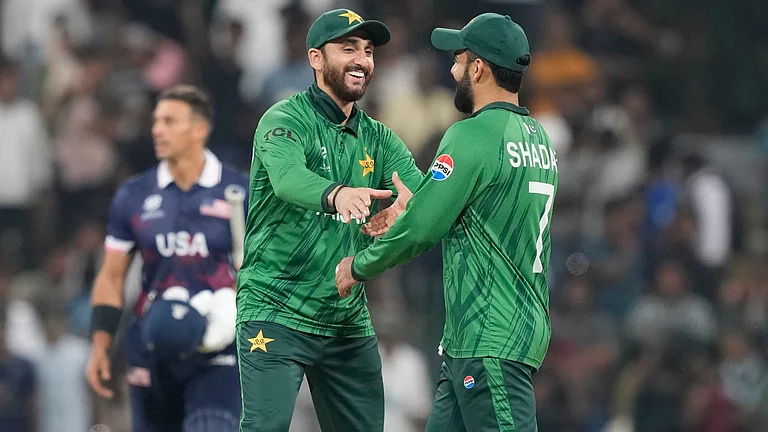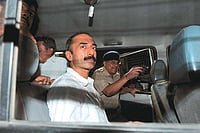Casual readers of the happenings in the country’s business capital could be excused if they arrive at the alarming conclusion that the Mumbai city police is a den of iniquity. It is not! How the force performs at any given time depends on the character and proclivities of its leader, the police commissioner. An honest and responsible leader would have doused any illegal demand the political leadership would make on the subordinate staff. Inspectors who man each precinct and the senior ones among them who are in charge of police stations are natural prey for predator politicians in a position to influence the officer’s career. It is the duty of the commissioner to provide the protective shield.
Sanjay Patil, a senior inspector in charge of the social services cell of the city’s Crime Branch, and ‘encounter specialist’ Sachin Waze, an assistant police inspector (API), were allegedly called by the Maharashtra home minister to his residence and ordered to collect Rs 100 crore a month, obviously for the NCP, which had selected him for the onerous task of guiding the home department. Param Bir Singh made this allegation in his eight-page letter to the chief minister published after he was removed from the post of police commissioner.
ALSO READ: Bollywood Whodunnit
If Param Bir had confronted the home minister as soon as Patil and Waze reported the outlandish demand to their chief or if he had approached the chief minister immediately thereafter to protest, then the people may have absolved him of blame. He does not seem to have reacted at the time he should have, but waited till he was accused of poor supervision and shifted out.

The ‘encounter specialist’ Waze, an adventure-seeker with 63 kills under his belt, had been charged with the custodial murder of one Khwaja Yunus, an engineer by training and profession, in 2002. Waze had been placed under suspension in 2004 and was facing trial for murder. The trial has not started till date. Instead, Waze applied for reinstatement in 2007. This request was rejected. So, in 2008 he joined the Shiv Sena, obviously to find a cover for some business ventures where the lines between the legitimate and the illegal were likely to blur.
ALSO READ: Param Bir Chakra
It is obvious now that the business ventures did not prosper. He applied for reinstatement again, and this time with the Shiv Sena as senior partner in the three-party government, and a supportive police commissioner in place, he succeeded. Subodh Jaiswal, the DGP, would have been an impediment. He was excluded and a two-member committee of the additional chief secretary (home) and Param Bir, the police commissioner, reinstated him on the specious ground that he was required for Covid-related duties.
The political leadership obviously played ball, seeing in the induction of an ‘encounter specialist’ a sure recipe for replenishing their coffers. Vaze was appointed head of the Crime Intelligence wing, a position always manned by a senior inspector. This caused some consternation in police circles. Their disgust was exacerbated when they found that Waze reported directly to the police commissioner, ignoring the ACP, the DCP, the Addl. CP and the Joint CP, an officer of IGP rank. This disturbed the entire hierarchical structure and undermined discipline.
It is unusual for police commissioners to deal directly with an API, six ranks lower. I have known of such an arrangement only once in the past when two sub-inspectors, one rank lower than an API, had wormed their way into the then commissioner’s sanctum sanctorum. They had also befriended the chief minister. The linkage may have benefited the police commissioner for some time, but in the end he had to quit office in disgrace when the policemen revolted and prevented him from attending the October 21 commemoration parade at his own headquarters. That episode in an otherwise glorious history should have served as a lesson to the shrewd political operator, Sharad Pawar, when Param Bir’s candidature was placed before him. It is learnt that Pawar had two marathon sessions with Param Bir prior to his installation as the city’s police commissioner. How and why did this master strategist falter in his decision-making?
There were two outstanding commissioners in Thane and Pune awaiting their turn and available. They were safe bets, but they were overlooked. Officers who lobby for appointments should be automatically sidelined, but the Maharashtra Vikas Aghadi government chose to ignore this wise guiding principle. The result has been disastrous for all concerned—the one who lobbied, those who made the wrong choices, the Mumbai city police and the people of this great cosmopolitan city.
It will take time to heal the wounds. If Jaiswal, the DGP who was eased out, was in the chair, the task would have been easier to accomplish. His choices were spot on because he knew the worth of each of his officers. All his choices were ignored in favour of choices made on extraneous grounds. He was accused of “interfering” in transfers. He got so disgusted that he asked to be deputed to the Centre. And that is where his services are being profitably utilised by a government that should be happy to have an officer of his calibre, not wanted by his own home state.
(Views expressed are personal)
Julio Ribeiro, Former police commissioner of Mumbai
























